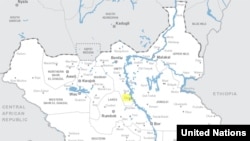The head of the United Nations' World Food Program has warned that famine could be declared in parts of South Sudan and an entire generation could be lost to violence and hunger if 15 months of fighting does not end soon.
Ertharin Cousin said she saw severe food insecurity this weekend when she visited parts of South Sudan that have been hard-hit by the conflict that erupted in December 2013 and is still ongoing in at least three states.
The visit is Cousin’s second to South Sudan in four months. In that short space of time, Cousin said things have gone from bad to worse in the young country.
"Even people who had something when I was here the last time, they have depleted those assets and now they have even less or nothing," Cousin said.
"The longer the crisis goes on, the more people suffer. And the more the suffering spreads to those who may have the ability to eat today, tomorrow they will have nothing."
Losing a generation
Cousin said a generation of South Sudanese could be lost if the conflict is allowed to grind on.
“What we need, first and foremost, is peace... so that people can go back to their homes and back to their lives," Cousin said.
"But, until then, we need to let the world know that there are victims who are not part of this conflict, who just want to have the ability to feed their children, to have the health care that they need, to have the support that they require so that we don’t lose an entire generation while an unnecessary war goes on.”
During her three-day visit to South Sudan, Cousin met with government officials, representatives of aid organizations and internally displaced persons (IDPs) in the rebel-controlled town of Ganyiel, in Unity State. She took a boat into the Sudd wetlands to meet with people who have sought shelter from the violence on islands deep in the marshlands.
An estimated 50,000 IDPs are sheltering in Ganyiel and surrounding Panyijar County. They fled to Ganyiel from Bentiu, the state capital which a U.N. official described last year as having been wiped off the map by the fighting; from Malakal, the capital of Upper Nile state, and from parts of Jonglei state.
Walking for days to safety
Cousin said she met IDPs who trekked for days to get to the safety of Ganyiel.
“I have talked to women who have walked over 200 miles, with six to seven children... Their husbands have been killed but what they know is they have to keep walking because their children had no food,” she said.
The U.S. Ambassador to the U.N. Agencies in Rome, David Lane, accompanied Cousin on the trip to South Sudan. Lane said he was saddened that the country has slid back into conflict since he visited two years ago.
"The kind of projects we saw then were not just about feeding people and keeping them alive, it was actually about transforming rural agricultural," he said.
Two million displaced
The IDPs in Ganyiel are just a fraction of the 2 million people who have fled their homes since December 2013, when fighting erupted between forces loyal to President Salva Kiir and rebels allied with former vice president Riek Machar. Half a milltion have sought refuge in neighboring countries, but the vast majority of the displaced - around 1.5 million people - have stayed in South Sudan.
U.N. officials have said 2.5 million South Sudanese face severe levels of food insecurity now, and, by year's end, more than 4 million will need assistance. No official death toll has been released for the violence, but the International Crisis Group think-tank last year said it believes that at least 50,000 people have died in the fighting.
The government and rebels have been holding negotiations for more than a year to end the fighting, but the talks have not yielded a lasting peace deal. The most recent attempt to restore peace ended in failure earlier this month, and fighting has flared up in parts of South Sudan since then.





